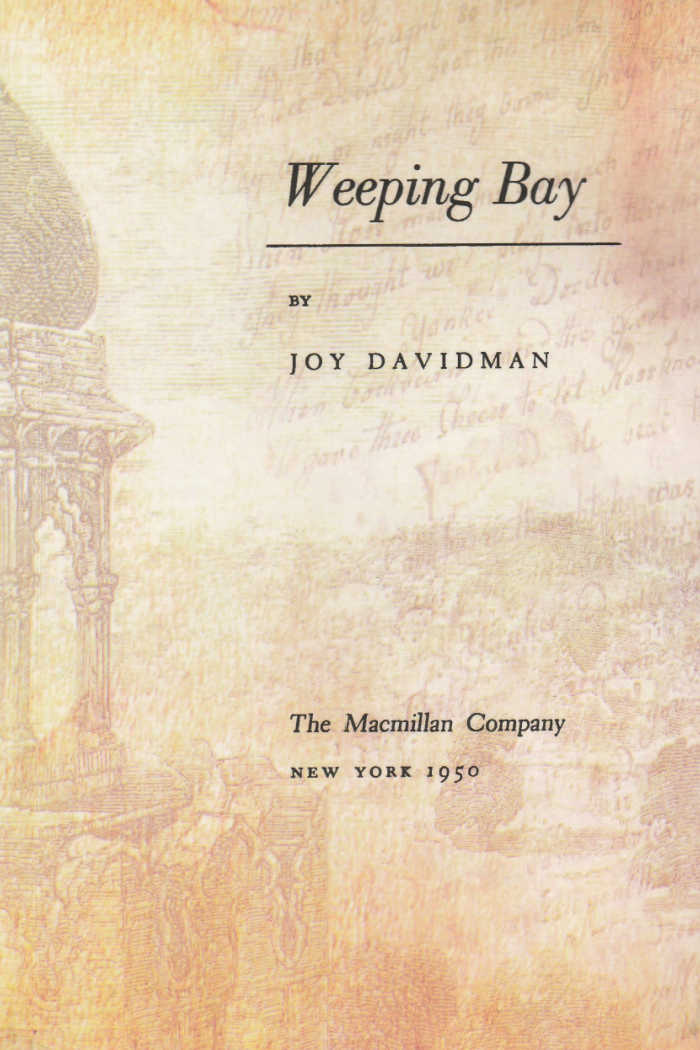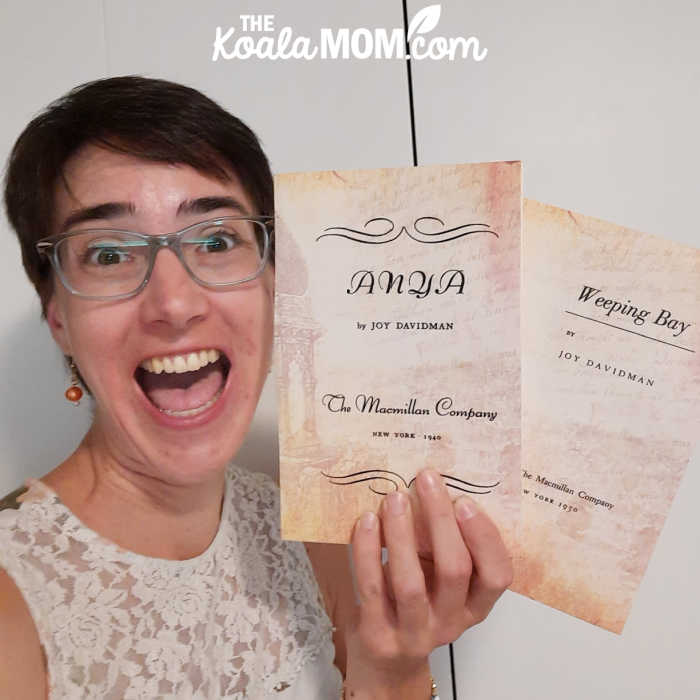Weeping Bay is Joy Davidman’s second novel, published a decade after her first, Anya. While Anya explores the inner life of one character, Weeping Bay takes on an entire village, introducing readers to the variety of characters that make up a small town in the Gaspe peninsula. Davidman draws readers in with the same attention to detail and deep insight into human dreams and desires.

Weeping Bay plot summary
Francois-Xavier Desrosiers is a young priest and organizer for the Catholic syndicates who arrives in Weeping Bay hoping to establish a union among the Catholic factory workers there. Weeping Bay is a small town with a hotel for American tourists, a stove-making factory, a large Catholic church, and a fishing industry. Most of the townspeople work either for the factory or the fishery.
Herve Kirouac is a former fisherman now turned factory worker who dreams of better things for his own son. He and his wife love each other and their five children dearly, and yet struggle with the thought of bringing more children into a bleak and difficult world. Marie-Ange is devout and Herve is hot-headed, a leader among the factory men who soon catches Desrosiers attention.
Leon Ouellet is a bellboy at the Hotel Bon Accueil, where his wife Mireille also hopes to get a job. However, her poor teeth—a common problem among the townspeople—prevent her from getting hired. Mireille has numerous younger siblings, including several who are deaf and dumb, and has seen her dear mother become a shadow of her former self, and desperately wants to avoid that for herself.
Weeping Bay is controlled by Monsieur le Cure Philemon Chouinard, an astute businessman and Catholic priest who has built the most beautiful church on the peninsula; his brother, Clodomir Chouinard, the chief of police, who must confess his sins frequently and help ensure that the parishioners don’t cause trouble; and Monsieur Boisvert, the factory owner, for whom most of the town works for barely livable wages.
As Desrosiers stirs up the factory men with new ideas, each person in town struggles with their own hopes and hungers, losses and longings, and questions of faith. The devout members of the town turn to prayer, desperately seeking answers:
Pray for us, Virgin Mother. I am Marie-Ange Kirouac, born Ouellet. I have sons of my own. … The baby in your arms, was he born hard? Mine were born hard. With Paul-Emile, the midwife thought she would lose us both; my husband called the doctor from Lac de Famine, and after thirty hours that child was born, and after six months we had finished paying for him. Even with Olivan, and he was my fifth, there was long pain and much bleeding, and since then I begin to look my age.
With your Son, no doubt there were angels assisting. I had no angels. And yet—was it so with you?—and yet the pain was love. This, one can tell a woman: the joy of the first motion in the womb, the child beating with his strong fists, and the joy of the small mouth sucking at the breast. This, one cannot tell a man, even if he be a priest. O Mother, help me; thou knowest the truth, that I deny my husband not for fear of the pretty priest and his Hell, but for fear of the unborn children, the murdered ones, wailing in small voices in my dreams.
My thoughts on Weeping Bay
Joy Davidman paints a heartrending picture of a small French Catholic town in the mid 1900s. The priests who should care for the deep needs of their flock are instead self-interested and gluttonous, addicted to their own comforts and desires. A few members of the town live in wealthy comfort, while most work hard, starve, and die young. Several characters die tragic, preventable deaths in the course of the novel.
One hopes that Desrosiers is able to bring about some change before the end, and yet he fails to do so. Herve, who had been the first to join Desrosiers’ cause and lead to its downfall in the end by his flash of temper, has a flash of insight and confronts Desrosiers: “I think you did not even see us as live men. You only saw something you wanted to make out of us. Like in the factory, a finished stove. And we, I think we were just the raw iron. What was it you wanted to make, M. le Abbe? Was it a union?”
In the end, it is an itinerant circus worker / Protestant preacher who brings some hope to the story. He reaches out to Herve, telling him, “I ain’t denying book education, brother. Long as it serves the Lord. But there’s three things above all else a man’s got to have: faith, hope, and love. And the greatest of these is love. And bless, God, brother, that’s what you’ve give him—I can see it a-shining out of him like a candle through a cabin wall, right through the chinks.”
Catholics and Catholic Priests in Weeping Bay
As a convert to Catholicism, it was hard to read a novel that is such an indictment against the Catholic Church. It grieves me to think that any priest would act as the priests in this novel did. The harsh truth is that there have been poor shepherds in the church, in every denomination, since Jesus’ walked this earth. I frequently remind myself “not to throw out Jesus with Judas.” I am deeply grateful to know many, many good and worthy Catholic priests, and to know that Church teachings on family planning has changed greatly since Davidman wrote about the struggles of women like Marie-Ange and Mirielle.
Weeping Bay is principally a novel with a message. It is expressed in the epigraph, which quotes Christ’s words to Peter (John 21:17) concluding with the admonition: “Feed my sheep.” And it is borne home by relentlessly exposing the sufferings of the hungry flock. But it proposes no credible solution. And since the cause of the hunger appears to be nothing but the sheer wickedness of the bad, and the fecklessness of the good shepherds, our interest in the long bill of accusation tends to flag and the novel collapses into mere “preaching against sin.” ~ Paul Leopold, “The Writings of Joy Davidman Lewis“
More about Joy Davidman Gresham Lewis
Joy dedicated Anya to her mother, whom she said first told her the story of Anya. She dedicated Weeping Bay to her father, “who helped me find out.” Between writing these two novels, Joy had married, become a mother to two sons, and converted from atheism / communism to Christianity.
Joy Davidman married C. S. Lewis in 1956. She died of leukemia in 1960 at the age of only 45. She was the author of two novels, several collections of poetry, and some nonfiction. Her story is told in the fictional novel Becoming Mrs. Lewis by Patti Callahan.


No Responses Yet